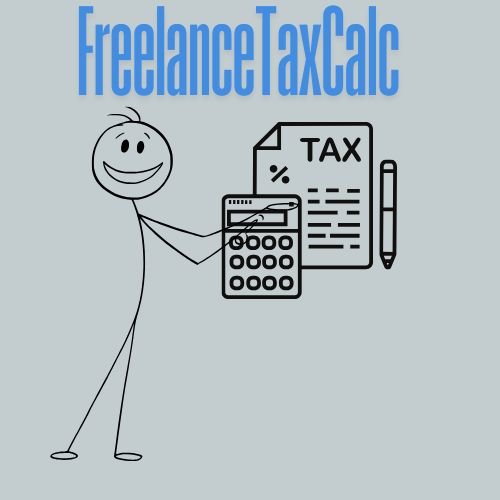Freelance Tax deductions
As a freelancer, you’re your own boss — but you’re also your own accountant, bookkeeper, and tax filer. Unlike traditional employees, freelancers pay self-employment tax, and that burden can feel overwhelming if you’re not prepared.
The good news? The IRS allows you to deduct many common expenses as long as they’re “ordinary and necessary” for your freelance business. Understanding these write-offs can reduce your taxable income, increase your refund, and improve your financial planning for 2025.
Use our Freelance Tax Calculator to estimate your taxes instantly based on income, expenses, and state.
1. Home Office Deduction
If you work from home — even part of the time — you may qualify for the home office deduction.
What’s Covered:
- Rent or mortgage interest
- Property taxes
- Homeowners insurance
- Utilities (electricity, water, heating)
- Maintenance (painting, repairs)
- Internet (partial)
Two Methods:
- Simplified Method: $5 per square foot (up to 300 sq ft = $1,500 max)
- Actual Expense Method: Proportional calculation of actual home expenses based on square footage used for business
Click here for more information : IRS: Home Office Deduction
2. Business Equipment & Tools
Investments in hardware, software, or digital tools for your freelance work are fully deductible.
Examples:
- Laptop or desktop computers
- External monitors, webcams, microphones
- Desk, ergonomic chair, lighting
- Software: Grammarly, Microsoft 365, Adobe, Canva Pro
- Cloud storage like Dropbox or Google Drive
If an item costs under $2,500, it can usually be deducted in full the same year under Section 179.
3. Website, Hosting & Domain Expenses
As a freelancer, your website is your online storefront.
Deductible Items:
- Domain name (e.g., FreelanceTaxCalc.com)
- Web hosting (Hostinger, SiteGround)
- Paid WordPress themes (like Astra Pro)
- Plugins for functionality (Formidable Forms, Flying Scripts)
Pro Tip: Even your email marketing platform (like ConvertKit) and scheduler apps (like Calendly) count if used for client communication or lead generation.
4. Business Use of Phone & Internet
If you use your personal phone or internet service for work, you can deduct a business-use percentage.
Example:
- $80/month internet × 50% work use = $40/month deductible
- $70/month phone plan × 60% work use = $42/month deductible
Just be consistent and back it up with a usage log or billing records.
5. Courses, Certifications & Books
If the education improves your current freelance skills, it’s deductible.
Acceptable Examples:
- A copywriter taking SEO writing courses
- A designer learning Figma or UX strategy
- A tax consultant renewing certification
Books, audiobooks, webinars, and paid memberships (e.g., Copyhackers, Skillshare, Coursera) also qualify.
Important: The IRS does not allow you to deduct courses for a new trade or career path.
6. Marketing, Branding & Advertising
Growing your freelance business? Your marketing costs are 100% deductible.
Eligible Deductions:
- Paid ads (Google, Meta, LinkedIn)
- Business cards & branded stationery
- Email marketing (Mailchimp, ActiveCampaign)
- Logo design, branding kits
- Hiring a copywriter or web designer
7. Travel & Client Meetings
If you travel for business — such as conferences, client meetings, or speaking gigs — these expenses are deductible:
- Flights, trains, rental cars, mileage
- Hotels and accommodations
- 50% of meal costs
- Parking fees and tolls
Keep a log of business purpose, receipts, and dates.
8. Self-Employed Health Insurance
If you’re a freelancer and not eligible for an employer plan, your health insurance premiums are 100% deductible, including:
- Medical, dental, and vision premiums
- Qualified long-term care insurance
- Insurance for spouse and dependents
Click this link for more information : IRS: Health Insurance Deduction
9. Office Supplies & Subscriptions
Even small costs add up. You can deduct:
- Pens, notebooks, printer ink, paper
- Postage and shipping
- PO box rental
- Office plants or décor (used in client Zoom calls!)
- Professional memberships (e.g., Freelancers Union, AIGA, etc.)
10. Tax Prep & Professional Services
Any service that supports your freelance business can be deducted.
Examples:
- CPA or enrolled agent tax prep
- Bookkeeping services
- Legal consultations
- Invoicing software (FreshBooks, Wave, QuickBooks Self-Employed)
- Freelancer insurance (like Hiscox)
Bonus: Try the Tax Calculator
Want to see how much you’ll save with these deductions?
Use our Freelance Tax Calculator to:
- Estimate federal & state tax
- Factor in deductions
- Avoid underpayment penalties
- Plan your quarterly taxes
Recap Table: Freelance Deductions at a Glance
| Deduction Type | Covered Items | Notes |
|---|---|---|
| Home Office | Rent, utilities, internet | Must be exclusive space for business |
| Equipment & Tools | Laptop, monitor, software | Section 179 may apply |
| Website & Hosting | Domain, plugins, themes | All business-related |
| Phone & Internet | Portion used for business | Use % estimate |
| Education | Courses, books, webinars | Must improve current skills |
| Marketing & Advertising | Ads, branding, email tools | Must support business growth |
| Travel & Meals | Flights, lodging, meals | 50% meals deductible |
| Health Insurance | Premiums for self & dependents | If not eligible for employer plan |
| Office Supplies | Paper, ink, memberships | Keep receipts |
| Tax & Legal Services | Accountants, software, legal advice | All directly related to freelancing |
What next ? Now that you know what to deduct:

